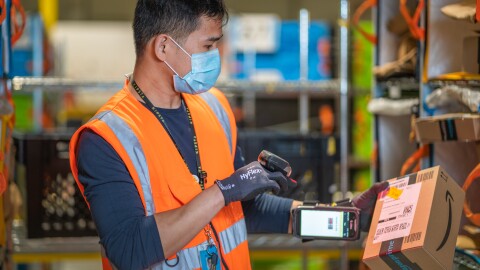Tuebingen/Berlin, 23 October 2017 - Today, Amazon and the Max Planck Society announced that they intend to enter into a strategic collaboration to promote research in the field of artificial intelligence (AI). Amazon plans to build an Amazon Research Center adjacent to the campus of the Max Planck Institute for Intelligent Systems in Tuebingen. As part of the Cyber Valley initiative, the new center intends to bring together international key players from science and industry to concentrate their research activities in the field of AI.
Amazon plans to invest 1.25 million Euro over the coming years to fund research groups in Tuebingen’s Cyber Valley tech initiative. Cyber Valley was launched in December 2016 and focuses on AI research, such as robotics, machine learning and computer vision. Among its initiators are the Max Planck Institute for Intelligent Systems, the State of Baden-Wuerttemberg, the universities of Stuttgart and Tuebingen, as well as BMW, Bosch, IAV, Daimler, Porsche, and ZF Friedrichshafen.
In order to boost applied research on AI, Amazon plans to create jobs for 100 high-skilled employees in its Tuebingen Research Center within the next five years. The Tuebingen site will be the fourth Amazon Research Center in Germany after Berlin, Dresden and Aachen. These high-skill employees will focus on using AI to understand visual data to improve the customer experience across Amazon products and services, including Amazon Web Services and Alexa.
Two directors from the Max Planck Institute for Intelligent Systems, Bernhard Schölkopf (Department of Empirical Inference) and Michael J. Black (Department of Perceiving Systems), will support the leadership of the new center as Distinguished Amazon Scholars while maintaining their commitments to excellence with the Max Planck Institute. Prof. Dr. Bernhard Schölkopf is a leading machine learning expert in Europe and co-inventor of computational photography methods. He is also co-inventor of ground-breaking technology that enables computers to understand causality, which helps AI systems to predict customer behavior in response to automated decisions, for example, the order of search results to improve their search experience. Prof. Dr. Black is a leading expert in computer vision and a co-founder of Body Labs, which commercializes human-aware AI that understands 3D body motion and shape for applications in numerous industries. Amazon has acquired Body Labs, which is headquartered in New York.
As a part of the collaboration between Amazon and the Max Planck Society, Amazon will dedicate 420,000 Euro (500,000 US-Dollars) of Amazon Research Awards (ARA) annually to the Max Planck Society. The Amazon Research Awards (ARA) program visitfunds academic research and related contributions to open-source projects by top academic researchers around the world. ARA are awarded to faculty members at academic institutions in North America and Europe for research in areas such as robotics, machine learning, and computer vision. Max Planck Society will use the ARA support to fund PhD candidates and post-doctoral research within the field of scope covered by the Max Planck Institute for Intelligent Systems.
“We appreciate Amazon’s commitment in the Cyber Valley and for the research on artificial intelligence,” says Max Planck President Martin Stratmann. “We will gain another strong partner who will further increase the international significance of research in the area of machine learning and computer vision in the Stuttgart and Tuebingen region. With Amazon joining the Cyber Valley, our idea to create a fertile environment for business activities will gain momentum by expanding AI research in the Stuttgart-Tuebingen area. Only by bringing together world-class research and entrepreneurial spirit can we create the breeding ground for innovations that may prove to be technological breakthroughs in the future.”
Ralf Herbrich, Director of Amazon Machine Learning and Managing Director of the Amazon Development Center Germany, adds: “Amazon continuously invests in research and high-skilled jobs. With our Amazon Research center in Tuebingen, we will become part of one of the largest research initiatives in Europe in the area of artificial intelligence. This underlines our commitment to create high-skilled jobs in breakthrough technologies.”
Forward-Looking Statements
This announcement contains forward-looking statements within the meaning of Section 27A of the Securities Act of 1933 and Section 21E of the Securities Exchange Act of 1934. Actual results may differ significantly from management’s expectations. These forward-looking statements involve risks and uncertainties that include, among others, risks related to competition, management of growth, new products, services and technologies, potential fluctuations in operating results, international expansion, outcomes of legal proceedings and claims, fulfillment and data center optimization, seasonality, commercial agreements, acquisitions and strategic transactions, foreign exchange rates, system interruption, inventory, government regulation and taxation, payments, and fraud. More information about factors that potentially could affect Amazon.com’s financial results is included in Amazon.com’s filings with the Securities and Exchange Commission, including its most recent Annual Report on Form 10-K and subsequent filings.
About Amazon
Amazon is guided by four principles: customer obsession rather than competitor focus, passion for invention, commitment to operational excellence, and long-term thinking. Customer reviews, 1-Click shopping, personalized recommendations, Prime, Fulfillment by Amazon, AWS, Kindle Direct Publishing, Kindle, Fire tablets, Fire TV, Amazon Echo, and Alexa are some of the products and services pioneered by Amazon. For more information, visit and follow @AmazonNews.
About the Max Planck Society
The Max Planck Society (MPG) is Germany’s leading research organization. In 84 Max Planck facilities, more than 6,500 scientists and over 7,600 graduate students, undergraduates, student assistants, and visiting scientists conduct basic research in the natural sciences, life sciences and humanities. The Max Planck Society was founded in 1948 as a successor to the Kaiser Wilhelm Society which was established in 1911. Since then, 18 Nobel laureates have emerged from its ranks. The institutes are of international repute and attract top researchers from around the world. In addition to five foreign institutions, the MPG operates another 17 Max Planck Centers with research institutions such as the Princeton University in the USA, Science Po in France, the University College London in UK, and the University of Tokyo in Japan. Equally funded by federal and state governments, the Max Planck Society has an annual budget of 1.6 billion Euros.











